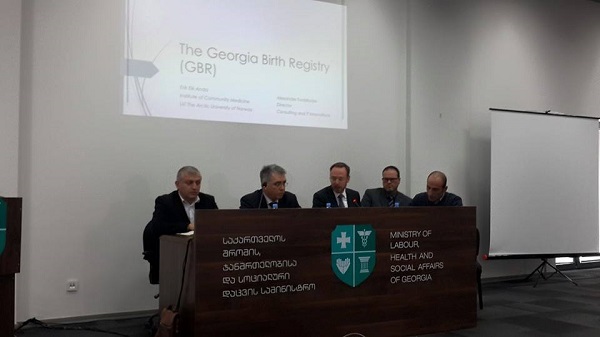Georgian Gov’t takes steps to support maternal and newborn health

Georgia is stepping up its efforts to provide better care for pregnant women, new mothers and babies.
Monitoring of maternal and newborn health was in focus at the Ministry of Labour, Health and Social Affairs of Georgia today where a new, electronic birth registry system was discussed by health officials in working in a range of areas.
Health Ministry representatives, members of the United Nations Children’s Fund (UNCEF) and various officials from other state and academic bodies attended the presentation of the new electronic birth registry, which aimed to better monitor the health of pregnant women, new mothers and their newborns.
At the meeting it was emphasized the new system would help to further enhance the already available healthcare services for pregnant women and children.
UNICEF Georgia said the new system was an electronic module that did not have to be installed in every computer and that considerably reduced administrative costs. The module collected maternal, fetus, and newborn data that allowed full epidemiological analysis.
The new system was introduced today by the Ministry, the Social Service Agency and the National Centre for Disease Control and Public Health, with technical and financial support from UNICED. The process was also supported by Norway’s University of Tromso.

Electronic birth registry system discussed in Tbilisi. Photo by UNICEF.
Specifics of the new system included:
- Any pregnant woman who addressed the neonatal clinic for services will be registered in the system with her personal number. The system will collect all crucial information during the woman’s pregnancy with full confidentiality. Only authorized doctors will have access to the data when providing delivery services or high risk pregnancy inpatient services. The new system will ensure that maternity/medical service providers are informed about the details of the pregnancy period.
- The system will also contain relevant birth-related information. Data on the newborn will be entered into the system and a personal number will be assigned to the child. Personal numbers of the mother and the child will be interlinked for further analysis.
- For the purposes of medical statistics, the system will generate reports eliminating the need for reentry of data.
- Paper vouchers for antenatal surveillance will be replaced by electronic services that will simplify the provision of state-funded antenatal services. The need to apply in person to the Social Service Agency will no longer exist, whereas the agency will be able to easily monitor provision and quality of the services.
- The country will acquire a tool for real-time surveillance of inpatient medical services to women with high-risk pregnancies or during labour.
UNICEF added from 2016 in Georgia it will be mandatory to enter data in the electronic module for maternal and newborn medical surveillance.
With this module the country will improve the maternal and child information management system, guarantee the accuracy of the data, facilitate monitoring of and reporting on the service provision, improve the service quality and take an active part in global scientific researches,” UNICEF said.
Sascha Graumann, UNICEF representative to Georgia said the new system will help to reduce the number of deaths among pregnant women and newborn babies.
To ensure accuracy of the information, Health Minister David Sergeenko said up to 500 representatives of various medical institutions had been trained nationwide, including capital Tbilisi and western Imereti, Samegrelo and Adjara regions.
 Tweet
Tweet  Share
Share